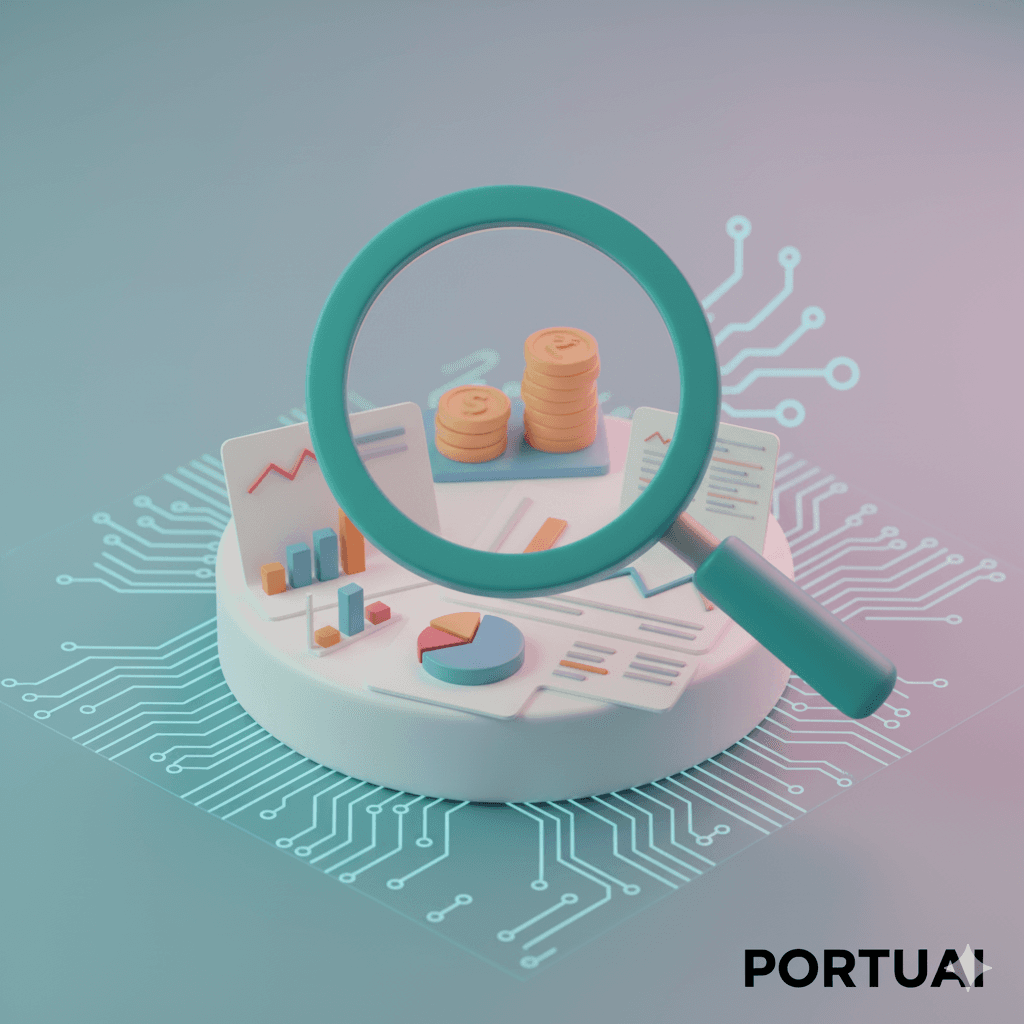Top AI-Driven Investment Strategies from World's Richest Investors

Venkateshwar Jambula
Lead Market Researcher
8 min read
•Published on September 17, 2024
•Mastering Wealth: AI-Powered Insights from Top Global Investors
In the dynamic world of financial markets, the pursuit of wealth is often driven by a blend of passion, strategic thinking, and an unyielding desire for a competitive edge. While the allure of quick riches can be tempting, enduring success is built on a foundation of disciplined, data-driven decision-making. At PortoAI, we believe that the principles employed by the most successful investors can be amplified and refined through the power of artificial intelligence.
This article delves into the investment philosophies of some of the world's most accomplished investors, examining the core tenets that have propelled them to the pinnacle of financial success. We'll explore how these strategies, when augmented by AI, can provide a significant advantage in today's complex market landscape.
Warren Buffett: The Oracle of Omaha's Enduring Principles
Warren Buffett's investment philosophy is a masterclass in value investing. His famous adage, "If you don't find a way to make money while you sleep, you will have to work until you die," underscores the power of compounding and long-term wealth creation. Buffett's approach centers on identifying well-managed, undervalued companies with durable competitive advantages and holding them indefinitely.
Key Principles:
- Value Investing: Buying stocks trading below their intrinsic value.
- Long-Term Horizon: Holding investments for extended periods to benefit from compounding.
- Moats: Focusing on companies with sustainable competitive advantages.
PortoAI Application: While Buffett's qualitative analysis is legendary, PortoAI's Market Lens can help identify undervalued companies by analyzing financial statements, market sentiment, and competitive landscapes at scale, providing data-backed support for your value assessments.
Carl Icahn: The Activist Investor's Contrarian Approach
Carl Icahn built his fortune as a contrarian investor, often acquiring significant stakes in companies he believed were undervalued by the market. His strategy involves identifying businesses with poor price-to-earnings ratios or book values exceeding market values, then actively engaging with management to unlock shareholder value, often through board changes or asset divestitures.
Key Principles:
- Contrarianism: Investing against prevailing market sentiment.
- Activism: Driving change within companies to enhance shareholder value.
- Deep Value: Seeking assets significantly below their perceived worth.
PortoAI Application: PortoAI's signal generation can highlight companies exhibiting characteristics of undervaluation and distress, enabling investors to identify potential contrarian opportunities before they become widely recognized.
Jim Simons: The Quant King's Mathematical Prowess
Jim Simons, a former mathematician and codebreaker, revolutionized hedge fund management with Renaissance Technologies. His success stems from applying sophisticated mathematical and statistical models to financial data, identifying non-obvious patterns to predict market movements and generate profits. Simons exemplifies the power of quantitative analysis in finance.
Key Principles:
- Quantitative Models: Utilizing complex algorithms and statistical analysis.
- Data Synthesis: Extracting insights from vast datasets.
- Algorithmic Trading: Employing systematic, data-driven trading strategies.
PortoAI Application: This is where PortoAI truly shines. Our platform is built on similar principles, leveraging advanced AI to process and analyze market data, identify predictive patterns, and generate actionable investment signals, democratizing quant strategies for sophisticated investors.
George Soros: Navigating Market Inefficiencies with Leverage
George Soros is renowned for his ability to exploit market inefficiencies through large, leveraged bets. He possesses a keen understanding of global economic trends and utilizes this knowledge, combined with a willingness to admit and act on mistakes quickly, to achieve remarkable returns. Soros highlights the importance of understanding macroeconomics and market psychology.
Key Principles:
- Macroeconomic Insight: Understanding global economic forces.
- Market Inefficiencies: Capitalizing on temporary mispricings.
- Reflexivity: Recognizing how market participants influence market outcomes.
PortoAI Application: PortoAI's AI can process global news, economic indicators, and sentiment analysis to provide a comprehensive macroeconomic outlook, helping you identify potential inefficiencies and formulate informed, leveraged strategies.
Steve Cohen: The Art of Short-Term Trading and Pattern Recognition
Steve Cohen, founder of Point72 Asset Management, is known for his expertise in short-term trading. Unlike Buffett's long-term buy-and-hold strategy, Cohen thrives on rapid transactions, often executing hundreds per day. He utilizes proprietary systems to identify overvalued or undervalued assets quickly, demonstrating the efficacy of high-frequency analysis and pattern recognition.
Key Principles:
- Short-Term Trading: Focusing on rapid transaction cycles.
- Pattern Recognition: Identifying recurring market behaviors.
- Algorithmic Support: Employing technology for routine analysis.
PortoAI Application: PortoAI's real-time data processing and predictive analytics can support short-term trading strategies by identifying fleeting opportunities and market patterns that human traders might miss.
Paul Tudor Jones: Macro Trading and Market Psychology
Paul Tudor Jones, a legendary macro trader, emphasizes an "unwavering and unquenchable thirst for information and knowledge." His success comes from analyzing global events, capital flows, mass psychology, and both technical and fundamental asset analysis. His famous accurate prediction of the 1987 market crash is a testament to his foresight.
Key Principles:
- Macro Trading: Analyzing global economic and political events.
- Market Psychology: Understanding crowd behavior.
- Holistic Analysis: Combining technical, fundamental, and sentiment data.
PortoAI Application: PortoAI's AI synthesizes information from diverse sources, including news feeds, economic reports, and social media sentiment, providing the comprehensive data landscape necessary for effective macro trading.
Bruce Kovner: The Trader's Blend of Fundamentals and Charts
Bruce Kovner, who transitioned from a cab driver to a world-class trader, highlights the importance of both fundamental analysis and technical charting. As a macro trader, his strategies often focus on commodities and currencies, integrating a deep understanding of economic drivers with price action analysis.
Key Principles:
- Macroeconomic Focus: Trading based on global economic trends.
- Commodities & Currencies: Specialization in specific asset classes.
- Integrated Analysis: Combining fundamental and technical approaches.
PortoAI Application: PortoAI's platform provides robust tools for both fundamental data analysis and technical charting, allowing users to integrate these approaches seamlessly within their trading strategies.
Stanley Druckenmiller: Mastering Risk and Reward
Stanley Druckenmiller is admired for his ability to maximize gains when right and minimize losses when wrong. His top-down approach involves combining long and short positions across various asset classes based on macroeconomic expectations. Druckenmiller's discipline in risk management is as crucial as his investment acumen.
Key Principles:
- Risk Management: Prioritizing capital preservation.
- Top-Down Approach: Analyzing the broader economic picture first.
- Flexible Strategy: Adapting positions based on market outlook.
PortoAI Application: PortoAI's risk console offers sophisticated tools to monitor portfolio risk, stress-test positions, and implement effective risk management protocols, empowering investors to execute Druckenmiller's philosophy.
Julian Robertson: The Power of Long-Short Equity
Julian Robertson, founder of Tiger Management, famously aimed to invest in the "200 best companies" and short the "200 worst." His long-short equity strategy aimed to profit from the performance differential between meticulously selected long positions and carefully chosen short positions. While Tiger Management faced challenges, Robertson's influence on a generation of successful fund managers is undeniable.
Key Principles:
- Long-Short Strategy: Profiting from both rising and falling markets.
- Stock Selection: Identifying top-tier companies and flawed ones.
- Performance Arbitrage: Capitalizing on relative stock performance.
PortoAI Application: PortoAI's AI can assist in identifying high-conviction long candidates and potential short opportunities by analyzing company fundamentals, competitive positioning, and market sentiment.
John Arnold: The Energy Trader's Innovative Spirit
John Arnold, a former Enron trader who later founded Centaurus Advisors, demonstrated remarkable success in energy trading before pivoting to other ventures. His story highlights the importance of adaptability, deep market knowledge, and innovative thinking, even in specialized sectors like energy markets. His later investments in solar farms and oil ventures show a forward-looking perspective.
Key Principles:
- Specialized Expertise: Deep understanding of specific markets.
- Adaptability: Evolving strategies with market changes.
- Innovation: Exploring new investment frontiers.
PortoAI Application: PortoAI's customizable research environment allows for deep dives into specific sectors, like energy, and can help identify emerging trends and innovative investment opportunities across various asset classes.
Conclusion: Integrating AI for a Smarter Investment Future
The titans of the investment world, regardless of their specific strategies, share a common thread: a relentless pursuit of knowledge, a disciplined approach to risk, and an ability to synthesize complex information to make confident decisions. Today, artificial intelligence offers an unprecedented opportunity to augment these timeless principles.
By leveraging platforms like PortoAI, investors can access AI-powered insights, analyze vast datasets with unparalleled speed and accuracy, and refine their strategies for the modern market. Whether you favor value investing, quantitative analysis, or macro trading, PortoAI empowers you to make more informed, data-driven decisions, enhancing your potential for long-term wealth creation.
Disclaimer: This blog post is for educational purposes only and does not constitute investment advice. The securities and strategies discussed are for illustrative purposes and are not recommendations. Always conduct your own research and consult with a qualified financial advisor.
Blog
Investment Insights and Tips
Explore our latest investment strategies and insights.

Commodities
What is a Quote-Driven Market? Understanding Dealer Markets Explained
A quote-driven market refers to a type of financial market structure in which market participants trade through market makers who quote bid and ask prices for securities. Market makers play a crucial ...
Venkateshwar Jambula
September 28, 2024
•4 min read

Stocks
What is Swing Trading? A Data-Driven Guide for Investors
Swing trading is a method of trading where a market participant takes a position for a couple of days to a couple of weeks to take advantage of short- to medium-term price swings. This is done to capt...
Venkateshwar Jambula
September 28, 2024
•4 min read

Commodities
What is On-Balance Volume (OBV)? A Trader's Guide to Momentum
On-Balance Volume (OBV) is a technical analysis indicator that predicts the change in a stock’s price through its volume flow. When trading financial securities, price and volume are considered two ke...
Venkateshwar Jambula
September 28, 2024
•4 min read

Commodities
Master Algorithmic Trading: Strategies & AI Insights
Algorithmic trading is a method of automating trades based on pre-programmed instructions. Think of it like using an algorithm for intraday trading where it can automate trading decisions and swiftly ...
Venkateshwar Jambula
September 28, 2024
•6 min read